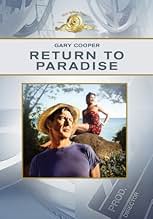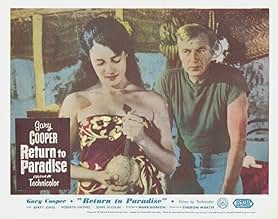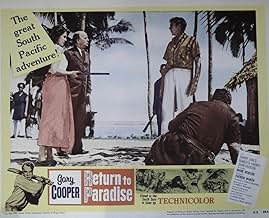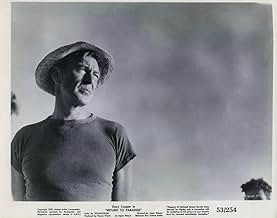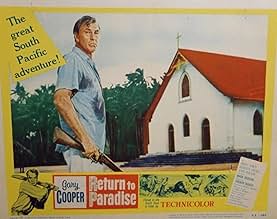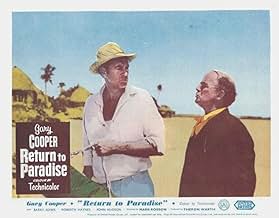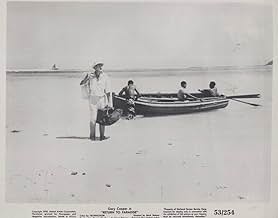An American drifter comes to a remote Polynesian island controlled by a Puritanical missionary and turns the social life of the island upside-down.An American drifter comes to a remote Polynesian island controlled by a Puritanical missionary and turns the social life of the island upside-down.An American drifter comes to a remote Polynesian island controlled by a Puritanical missionary and turns the social life of the island upside-down.
Moira Walker
- Turia
- (as Moira MacDonald)
Mamea Matatumua
- Tonga
- (as Chief Mamea Matatumua)
Va'a
- Rori at age 9
- (as Felice Va'a)
Frances Gow
- Mrs. Talbot
- (scenes deleted)
Brian McEwen
- Hank Elliott
- (scenes deleted)
Web Overlander
- Will Talbot
- (scenes deleted)
Henrietta Godinet
- Povana
- (uncredited)
- Director
- Writers
- All cast & crew
- Production, box office & more at IMDbPro
6.0917
1
2
3
4
5
6
7
8
9
10
Featured reviews
They Heal Each Other
Return to Paradise's main problem is that Gary Cooper at 52 is way too old for the part of the hedonistic Mr. Morgan. The part should have been played by someone like Kirk Douglas, William Holden, or Burt Lancaster.
Having said that Coop does all right in the role of the man whose arrival on one of the islands of the Samoan archipelago changes all around him.
The story begins in the late twenties when Cooper is put ashore on an island that is ruled by a tyrannical missionary preacher, Barry Jones, who's got 'wardens' to make sure that his decrees about the island's morality is enforced. Instinctively he knows that Cooper's arrival means trouble for his social order and tries to order him off the island. He even has Cooper's fledgling grass hut torn down because he's working on the sabbath.
But Coop's independent ways spark the latent resistance growing in the population. His taking on the 'wardens' is all that's needed.
Cooper has also fallen in love with a young Samoan girl, the beautiful Roberta Haynes. When she dies in childbirth, he leaves and becomes a charter schooner captain. Years later he returns and has to face up to his responsibility as a father.
A lot of Return to Paradise is a test of wills between Cooper and Barry Jones and at first glance Jones's character almost seems a caricature of a fire and brimstone preacher. It's not by any means on several levels. In his later work Hawaii, author James Michener explores that whole angle of the American missionaries in the 19th century and their impact on that Polynesian culture.
As he says in the film, Jones's father was killed in a native uprising and his wife died in childbirth. It made him bitter at the world and resulted in his creating a Christian Taliban like state on the island.
But there's a lot more to Jones than that. It turns out that the natives really did want to hear the good parts of his gospel and did not slacken in church attendance. There's a scene in the film when he sees the natives coming into his church where instead of going to the pulpit, he sits in the congregation among the natives. It's more eloquent than ten pages of dialog.
Jones becomes a better man and a wiser preacher as a result of Cooper's rebellion. He turns out to be a wise counselor indeed, especially when Cooper returns to the island and faces a crisis about his now teenage daughter, Moira McDonald. Essentially Cooper and Jones heal each other of the flaws in their respective characters.
Return to Paradise boasted a nice title song that is heard throughout the film. Later on Bing Crosby also used it as the title track of an album he did of south sea music for Frank Sinatra's Reprise label. It was composed by Dimitri Tiomkin and Ned Washington who last year gave Cooper that unforgettable theme from High Noon.
Filmed entirely on location on Samoa, it's a stunningly beautiful film to watch. You can't make a bad film from with that location.
It's one of Gary Cooper's lesser known works, but it's not a bad film and holds up well after over 50 years.
Having said that Coop does all right in the role of the man whose arrival on one of the islands of the Samoan archipelago changes all around him.
The story begins in the late twenties when Cooper is put ashore on an island that is ruled by a tyrannical missionary preacher, Barry Jones, who's got 'wardens' to make sure that his decrees about the island's morality is enforced. Instinctively he knows that Cooper's arrival means trouble for his social order and tries to order him off the island. He even has Cooper's fledgling grass hut torn down because he's working on the sabbath.
But Coop's independent ways spark the latent resistance growing in the population. His taking on the 'wardens' is all that's needed.
Cooper has also fallen in love with a young Samoan girl, the beautiful Roberta Haynes. When she dies in childbirth, he leaves and becomes a charter schooner captain. Years later he returns and has to face up to his responsibility as a father.
A lot of Return to Paradise is a test of wills between Cooper and Barry Jones and at first glance Jones's character almost seems a caricature of a fire and brimstone preacher. It's not by any means on several levels. In his later work Hawaii, author James Michener explores that whole angle of the American missionaries in the 19th century and their impact on that Polynesian culture.
As he says in the film, Jones's father was killed in a native uprising and his wife died in childbirth. It made him bitter at the world and resulted in his creating a Christian Taliban like state on the island.
But there's a lot more to Jones than that. It turns out that the natives really did want to hear the good parts of his gospel and did not slacken in church attendance. There's a scene in the film when he sees the natives coming into his church where instead of going to the pulpit, he sits in the congregation among the natives. It's more eloquent than ten pages of dialog.
Jones becomes a better man and a wiser preacher as a result of Cooper's rebellion. He turns out to be a wise counselor indeed, especially when Cooper returns to the island and faces a crisis about his now teenage daughter, Moira McDonald. Essentially Cooper and Jones heal each other of the flaws in their respective characters.
Return to Paradise boasted a nice title song that is heard throughout the film. Later on Bing Crosby also used it as the title track of an album he did of south sea music for Frank Sinatra's Reprise label. It was composed by Dimitri Tiomkin and Ned Washington who last year gave Cooper that unforgettable theme from High Noon.
Filmed entirely on location on Samoa, it's a stunningly beautiful film to watch. You can't make a bad film from with that location.
It's one of Gary Cooper's lesser known works, but it's not a bad film and holds up well after over 50 years.
Slow start, but it's totally worth it
Return to Paradise has a slow start, so if you're not a Gary Cooper fan, just hang in there and wait for it to get better. Trust me, it does. When I first read the synopsis it seemed like a comedy: Gary Cooper goes to a missionary-run island and shakes things up. How was I to know it was a James Michener classic? The exposition when Gary comes to the island, meets missionary Barry Jones, and settles into his grumpy isolation, is a bit slow. But a lot happens in this story; you just have to give it time.
If the protagonist were a different actor, it would have been an infinitely better movie. How many times have I said that about a Gary Cooper movie? To give him as much credit as I can, he does try his best in this movie. He actually does some acting! Still, he may be doing his best, but it's not as good as someone else's best.
I'd like to refrain from telling you about the plot, because it's very interesting to let it all unfold in Michener time and drama. Gary starts off the movie as a rude loner who likes his freedom and doesn't care who he offends. Barry Jones has to accept the intruder, but it makes things harder when one of the local girls is drawn to the aloof man. In addition to the unorthodox romance, I particularly liked Barry and Gary's unique friendship and how it changes throughout the years. You'll also get to see some beautiful location shoots, and as you might expect if you know Michener's work, it's a tearjerker. Enjoy!
If the protagonist were a different actor, it would have been an infinitely better movie. How many times have I said that about a Gary Cooper movie? To give him as much credit as I can, he does try his best in this movie. He actually does some acting! Still, he may be doing his best, but it's not as good as someone else's best.
I'd like to refrain from telling you about the plot, because it's very interesting to let it all unfold in Michener time and drama. Gary starts off the movie as a rude loner who likes his freedom and doesn't care who he offends. Barry Jones has to accept the intruder, but it makes things harder when one of the local girls is drawn to the aloof man. In addition to the unorthodox romance, I particularly liked Barry and Gary's unique friendship and how it changes throughout the years. You'll also get to see some beautiful location shoots, and as you might expect if you know Michener's work, it's a tearjerker. Enjoy!
storyline
This is not a review about the film, (which is amiable enough but we have all seen better) but a complaint. Yet look at the storyline regarding this movie written by Les Adams, completely ruins the film which we don't need to watch as he has told us the complete 'plot.' This happens far too often in my view, okay don't read the storyline, if so what is the point of putting it therea And as I finish this rant, there is a question, does this review contain spoilers
One Of Cooper's Worst Films
I have done many a review of Hary Cooper films and one thing has become apparent to me, he works best as either an action hero or with an excellent leading lady ( such as Barbara Stanwyck). Cooper in Samoa just does not cut it. There are very few Cooper films where he sucked: One Sunday Afternoon,, Design For Living, Good Sam, Love In The Aftermath. And Return To Parade. Even films of his that were no good, he gives a decent performance ( like Alice In Wonderland). Is it his worst film? No that is Design For Living from Lowe's by One Sunday Afternoon but this film does not cut it for me. 2 stars. Mostly for the scenery.
Return to Paradise
Barry Jones's "Pastor Corbett" rules a tiny Pacific island with a godly rod of iron until the unwelcome arrival of American "Morgan" (Gary Cooper). He's distinctly non-conformist and has no intention of observing the sabbath and the rest of preacher's regime. The latter man's resistance to the government soon elicits support from the put-upon islanders and soon a coup, of sorts, ensues. Once the new order has been established, a form of peace breaks out until WWII arrives on their patch and they find themselves hosting the crew of a shot-down American plane of soon they all want to be shot, pretty quickly! Initially, the clashes of personalities between Cooper and Jones are quite effective, but that quickly falls away and we are left with a rather unremarkable romantic drama that I felt rather dragged, especially the will they/won't they courting scenes between Cooper and Roberta Haynes's "Maeva". If character redemption is your thing, then maybe you'll get a bit more from this - but for me, what made it interesting at the start is allowed to peter out far too swiftly. Some nice island photography of Samoa, though.
Did you know
- TriviaThe 50th anniversary of the shooting of the film was celebrated on Upolu Island, Samoa, on November 5, 2003. Roberta Haynes, Donald Ashford, Terry Dunleavy, Moira MacDonald and local cast members were present.
- Quotes
Pastor Corbett: [to Maeva] You know it is a sin to stay out past nine o'clock!
- ConnectionsReferenced in A King in New York (1957)
- How long is Return to Paradise?Powered by Alexa
Details
- Release date
- Country of origin
- Language
- Also known as
- Rückkehr ins Paradies
- Filming locations
- Production company
- See more company credits at IMDbPro
Box office
- Budget
- $515,000 (estimated)
- Runtime
- 1h 40m(100 min)
- Color
- Aspect ratio
- 1.37 : 1
Contribute to this page
Suggest an edit or add missing content

